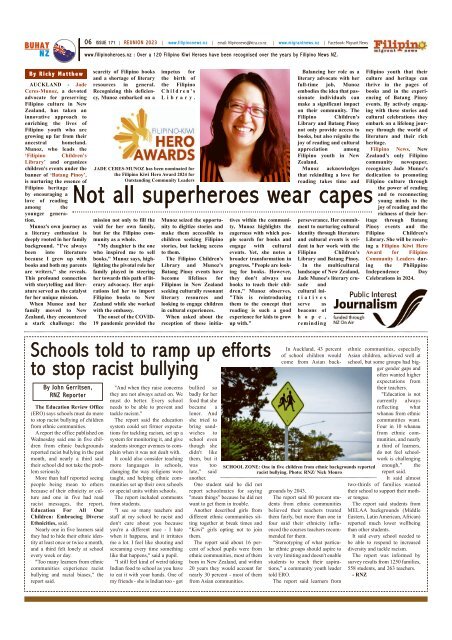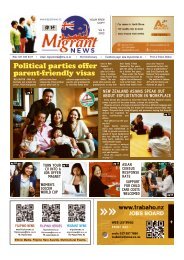Filipino News 171
www.filipinonews.nz, email: filipinonews@xtra.co.nz, mobile: 6427 495 8477.
www.filipinonews.nz, email: filipinonews@xtra.co.nz, mobile: 6427 495 8477.
Create successful ePaper yourself
Turn your PDF publications into a flip-book with our unique Google optimized e-Paper software.
BUHAY<br />
NZ<br />
06 ISSUE <strong>171</strong> | REUNION 2023 | www.filipinonews.nz | email: filipinonews@xtra.co.nz | www.migrantnews.nz | Facebook: Migrant <strong>News</strong><br />
www.filipinoheroes.nz : Over a 120 <strong>Filipino</strong> Kiwi Heroes have been recognised over the years by <strong>Filipino</strong> <strong>News</strong> NZ.<br />
B y R i c k y M a t t h e w scarcity of <strong>Filipino</strong> books impetus for<br />
Balancing her role as a <strong>Filipino</strong> youth that their<br />
and a shortage of literary the birth of<br />
literary advocate with her culture and heritage can<br />
AUCKLAND - Jade resources in general. the <strong>Filipino</strong><br />
full-time job, Munoz thrive in the pages of<br />
Ceres-Munoz, a devoted Recognizing this deficiency,<br />
Children's<br />
embodies the idea that pas-<br />
books and in the experi-<br />
advocate for preserving<br />
Munoz embarked on a Library.<br />
sionate individuals can encing of Batang Pinoy<br />
<strong>Filipino</strong> culture in New<br />
Zealand, has taken an<br />
make a significant impact<br />
on their community. The<br />
events. By actively engaging<br />
with these stories and<br />
innovative approach to<br />
<strong>Filipino</strong> Children's cultural celebrations they<br />
enriching the lives of<br />
Library and Batang Pinoy embark on a lifelong journey<br />
<strong>Filipino</strong> youth who are<br />
growing up far from their<br />
not only provide access to<br />
books, but also reignite the through the world of<br />
literature and their rich<br />
ancestral homeland.<br />
joy of reading and cultural heritage.<br />
Munoz, who leads the<br />
appreciation among <strong>Filipino</strong> <strong>News</strong>, New<br />
‘<strong>Filipino</strong> Children's<br />
<strong>Filipino</strong> youth in New Zealand’s only <strong>Filipino</strong><br />
Library’ and organizes<br />
Zealand.<br />
community newspaper,<br />
children's events under the JADE CERES-MUNOZ has been nominated for<br />
Munoz acknowledges recognizes Jade Munoz's<br />
banner of ‘Batang Pinoy’,<br />
the <strong>Filipino</strong> Kiwi Hero Award 2024 for<br />
that rekindling a love for dedication to promoting<br />
is nurturing the essence of<br />
Outstanding Community Leaders<br />
reading takes time and <strong>Filipino</strong> culture through<br />
<strong>Filipino</strong> heritage<br />
Not all superheroes wear capes<br />
the power of reading<br />
by encouraging a<br />
and to reconnecting<br />
love of reading<br />
young minds to the<br />
among the<br />
joy of reading and the<br />
younger generation.<br />
richness of their her-<br />
mission not only to fill the Munoz seized the opportutives<br />
within the communi-<br />
perseverance. Her commititage<br />
through Batang<br />
Munoz's own journey as void for her own family, nity to digitize stories and ty, Munoz highlights the ment to nurturing cultural Pinoy events and the<br />
a literary enthusiast is but for the <strong>Filipino</strong> community<br />
make them accessible to eagerness with which peo-<br />
identity through literature <strong>Filipino</strong> Children's<br />
deeply rooted in her family<br />
as a whole. children seeking <strong>Filipino</strong> ple search for books and and cultural events is evi-<br />
Library. She will be receiv-<br />
background. "I've always "My daughter is the one stories, but lacking access engage with cultural dent in her work with the ing a <strong>Filipino</strong> Kiwi Hero<br />
been into literature who inspired me to sell to them.<br />
events. Yet, she notes a <strong>Filipino</strong> Children's Award for <strong>Filipino</strong><br />
because I grew up with books," Munoz says, highlighting<br />
The <strong>Filipino</strong> Children's broader transformation in Library and Batang Pinoy. Community Leaders dur-<br />
books and both my parents<br />
the pivotal role her Library and Munoz's progress. "People are look-<br />
In the multicultural ing the Philippine<br />
are writers," she reveals. family played in steering Batang Pinoy events have ing for books. However, landscape of New Zealand, Independence Day<br />
This profound connection her towards this path of literary<br />
become lifelines for they don't always use Jade Munoz's literary cru-<br />
Celebrations in 2024.<br />
with storytelling and literature<br />
advocacy. Her aspi-<br />
<strong>Filipino</strong>s in New Zealand books to teach their chilsade<br />
and<br />
served as the catalyst rations led her to import seeking culturally resonant dren," Munoz observes. cultural initiatives<br />
for her unique mission. <strong>Filipino</strong> books to New literary resources and "This is reintroducing<br />
When Munoz and her Zealand while she worked looking to engage children them to the concept that serve as<br />
family moved to New with the embassy.<br />
in cultural experiences. reading is such a good beacons of<br />
Zealand, they encountered The onset of the COVID- When asked about the experience for kids to grow h o p e ,<br />
a stark challenge: the 19 pandemic provided the reception of these initia-<br />
up with."<br />
reminding<br />
Schools told to ramp up efforts<br />
to stop racist bullying<br />
By John Gerritsen,<br />
RNZ Reporter<br />
The Education Review Office<br />
(ERO) says schools must do more<br />
to stop racist bullying of children<br />
from ethnic communities.<br />
A report the office published on<br />
Wednesday said one in five children<br />
from ethnic backgrounds<br />
reported racist bullying in the past<br />
month, and nearly a third said<br />
their school did not take the problem<br />
seriously.<br />
More than half reported seeing<br />
people being mean to others<br />
because of their ethnicity or culture<br />
and one in five had read<br />
racist messages, the report,<br />
Education For All Our<br />
Children: Embracing Diverse<br />
Ethnicities, said.<br />
Nearly one in five learners said<br />
they had to hide their ethnic identity<br />
at least once or twice a month,<br />
and a third felt lonely at school<br />
every week or day.<br />
"Too many learners from ethnic<br />
communities experience racist<br />
bullying and racial biases," the<br />
report said.<br />
"And when they raise concerns<br />
they are not always acted on. We<br />
must do better. Every school<br />
needs to be able to prevent and<br />
tackle racism."<br />
The report said the education<br />
system could set firmer expectations<br />
for tackling racism, set up a<br />
system for monitoring it, and give<br />
students stronger avenues to complain<br />
when it was not dealt with.<br />
It could also consider teaching<br />
more languages in schools,<br />
changing the way religions were<br />
taught, and helping ethnic communities<br />
set up their own schools<br />
or special units within schools.<br />
The report included comments<br />
from students.<br />
"I see so many teachers and<br />
staff at my school be racist and<br />
don't care about you because<br />
you're a different race - I hate<br />
when it happens, and it irritates<br />
me a lot. I feel like shouting and<br />
screaming every time something<br />
like that happens," said a pupil.<br />
"I still feel kind of weird taking<br />
Indian food to school as you have<br />
to eat it with your hands. One of<br />
my friends - she is Indian too - got<br />
bullied so<br />
badly for her<br />
food that she<br />
became a<br />
loner. And<br />
she tried to<br />
bring sandwiches<br />
to<br />
school even<br />
though she<br />
didn't like<br />
them, but it<br />
was too<br />
late," said<br />
another.<br />
One student said he did not<br />
report schoolmates for saying<br />
"mean things" because he did not<br />
want to get them in trouble.<br />
Another described girls from<br />
different ethnic communities sitting<br />
together at break times and<br />
"Kiwi" girls opting not to join<br />
them.<br />
The report said about 16 percent<br />
of school pupils were from<br />
ethnic communities, most of them<br />
born in New Zealand, and within<br />
20 years they would account for<br />
nearly 30 percent - most of them<br />
from Asian communities.<br />
SCHOOL ZONE: One in five children from ethnic backgrounds reported<br />
racist bullying. Photo: RNZ/ Nick Monro<br />
In Auckland, 43 percent<br />
of school children would<br />
come from Asian backgrounds<br />
by 2043.<br />
The report said 80 percent students<br />
from ethnic communities<br />
believed their teachers treated<br />
them fairly, but more than one in<br />
four said their ethnicity influenced<br />
the courses teachers recommended<br />
for them.<br />
"Stereotyping of what particular<br />
ethnic groups should aspire to<br />
is very limiting and doesn't enable<br />
students to reach their aspirations,"<br />
a community youth leader<br />
told ERO.<br />
The report said learners from<br />
ethnic communities, especially<br />
Asian children, achieved well at<br />
school, but some groups had bigger<br />
gender gaps and<br />
often wanted higher<br />
expectations from<br />
their teachers.<br />
"Education is not<br />
currently always<br />
reflecting what<br />
whanau from ethnic<br />
communities want.<br />
Four in 10 whanau<br />
from ethnic communities,<br />
and nearly<br />
a third of learners,<br />
do not feel schoolwork<br />
is challenging<br />
enough," the<br />
report said.<br />
It said almost<br />
two-thirds of families wanted<br />
their school to support their mother<br />
tongue.<br />
The report said students from<br />
MELAA backgrounds (Middle<br />
Eastern, Latin American, African)<br />
reported much lower wellbeing<br />
than other students.<br />
It said every school needed to<br />
be able to respond to increased<br />
diversity and tackle racism.<br />
The report was informed by<br />
survey results from 1250 families,<br />
558 students, and 263 teachers.<br />
- RNZ
















